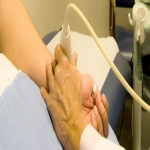
Do I have Carpal Tunnel Syndrome?
Your provider will obtain a detailed history, examination, along with possible x-rays to rule out arthritis or bony abnormalities but the most common test to determine if you have carpal tunnel syndrome is the EMG/NCV test. EMG stands for electromyogram and NCV stands for nerve conduction velocities. Unfortunately, this test has been called by patients “the needle torture test”. Not a comforting thought.
Dr. Atul Patel in our office at Kansas City Bone & Joint Clinic is the only certified Electromyographer in the state of Kansas. Dr. Patel has taken the time to sit down with us and answer a few questions regarding what to expect when having an EMG. Hopefully after reading this, you will find it is not so bad after all.
When a patient comes to you for an EMG/NCV test, what should they expect?
During an EMG, small, thin needles are placed in the muscle to record the electrical activity.
It has been said that the test can be painful. Is this true?
When the needles are inserted, you may feel some pain and discomfort, but typically it is minimal.
Can patient’s return to work and/or normal activities the same day?
There are no lasting side effects. You can do your normal activities after the tests.
How long does the test take?
The tests usually take 20 to 90 minutes, depending on the body parts being examined. You can do any of your normal activities like eating, driving, and exercising before the tests.
How long until results are available?
I will discuss your test results with you or send them to your regular doctor for them to discuss with you. After the exam, check with the doctor who sent you for the EMG test for the next step in your care.
In our next featured post, we will discuss treatment options.

